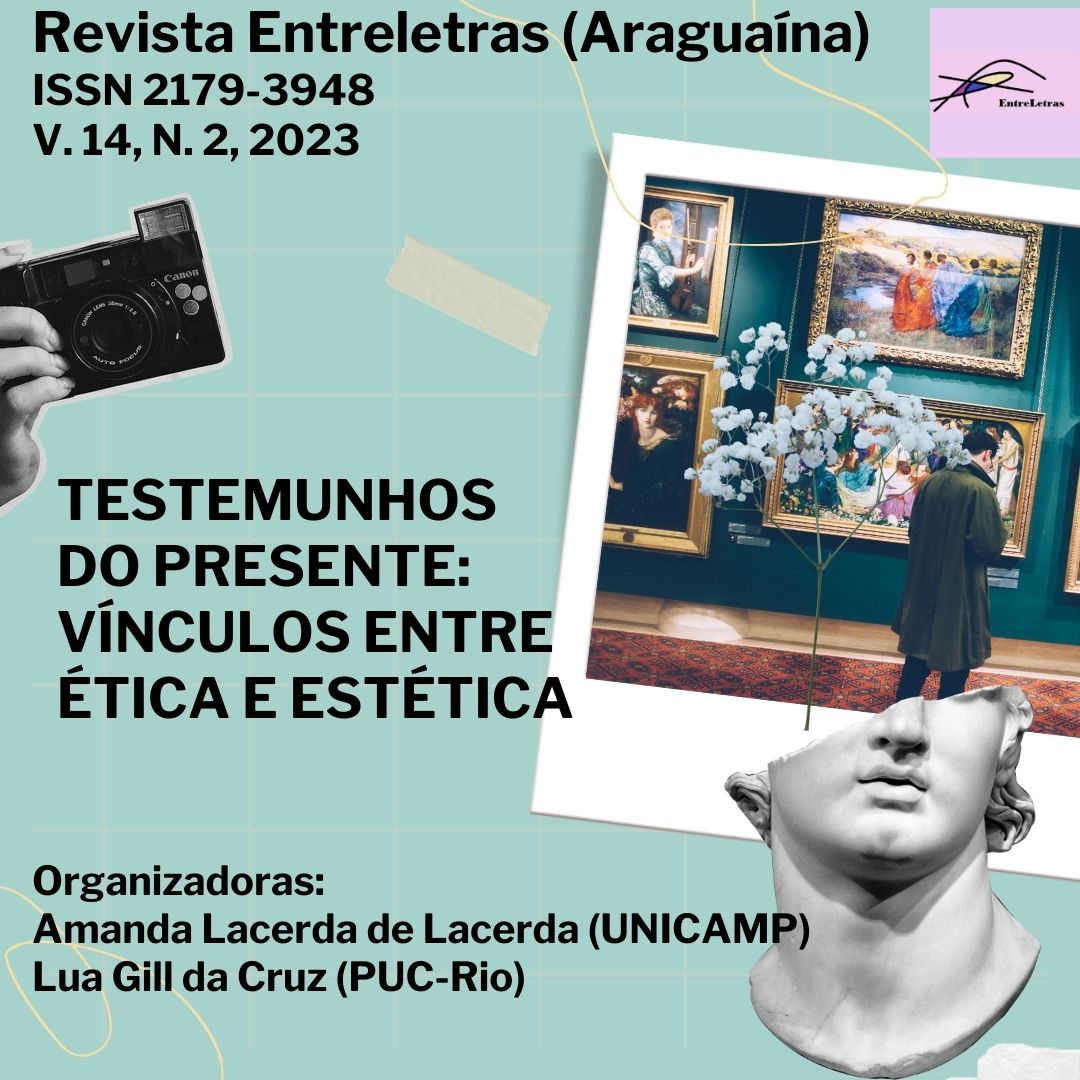TESTIMONY AS A TREND IN CONTEMPORARY MEMORY NOVEL WRITING
DOI:
https://doi.org/10.20873/uft2179-3948.2023v14n2p7-22Keywords:
Testimony, Memory, Theory of the novel, Sepharad, Antonio Muñoz MolinaAbstract
Testimony is evident trend in contemporary memory writing. The novel Sefarad (2001) by the Spanish Antonio Muñoz Molina (1956) is a fiction narrative produced from the transposition of oral testimonies heard by the writer in interviews and fortuitous conversations, from intertextuality with written testimonies (letters, diaries, memories, autobiographies, testimonies). Based on the analysis of this novel, this article aimed to show the presence of the testimony in the making of the contemporary memory novel, mainly in two key aspects: in the presence of “witnesses-characters” and in the ethical posture of the writers who are configured as “witness-auctor” (AGAMBEN, 2008).
Downloads
References
AGAMBEN, Giorgio. O que resta de Auschwitz: o arquivo e a testemunha (Homo Sacer III). Tradução Selvino J. Assmann. São Paulo: Boitempo, 2008.
ECO, Umberto. Pós-escrito a O nome da rosa. Tradução Letizia Zini Antunes e Álvaro Lorencini. Rio de Janeiro: Nova Fronteira, 1985.
GAGNEBIN, Jeanne Marie. Lembrar, escrever, esquecer. São Paulo: Editora 34, 2006.
MACCIUCI, Raquel. La memoria traumática en la novela del siglo XXI: esbozo de un itinerario. In: MACCIUCI, Raquel; POCHAT, María Teresa (Dir.); ENNIS, Juan Antonio (Coord.). Entre la memoria propia y la ajena: tendencias y debates en la narrativa española actual. 1 ed. La Plata: Ediciones del lado de acá, 2010, p. 17 – 49.
MUÑOZ MOLINA, Antonio. La nacionalidad del infortunio. El país, Madri, 29 nov. 1995. Tribuna: travesías, Cultura. Disponível em:< http://elpais.com/diario/1995/11/29/cultura>. Acesso em: 25 out. 2016.
MUÑOZ MOLINA, Antonio. Sefarad. Madri: Alfaguara, 2001.
PENNA, João Camillo. Este corpo, esta dor, esta fome: notas sobre o testemunho hispano-americano. In: SELIGMANN-SILVA, Márcio. (Org.). História, memória, literatura: o testemunho na era das catástrofes. Campinas: Editora da Unicamp, 2013, p. 297 – 350.
PERRONE-MOISÉS, Leyla. Mutações da literatura no século XXI. São Paulo: Companhia das Letras, 2016.
RICŒUR, Paul. A memória, a história, o esquecimento. Tradução Alain François et.al. Campinas: Editora da Unicamp, 2007.
SELIGMANN-SILVA, Márcio. Narrar o trauma – a questão dos testemunhos de catástrofes históricas. Psicologia Clínica, Rio de Janeiro, v. 20, n. 1, p. 65 – 82, 2008. Disponível em: < http://www.scielo.br/pdf/pc/v20n1/05>. Acesso em: 24 ago. 2018.
SELIGMANN-SILVA, Márcio. Testemunho e a política da memória: o tempo depois das catástrofes. Projeto História, São Paulo, v. 30, p. 71 – 98, jun. 2005. Disponível em: < http://revistas.pucsp.br/index.php/revph/article/view/2255>. Acesso em: 08 jun. 2017.
SONTAG, Susan. Ao mesmo tempo: o romancista e a discussão moral. In: SONTAG, Susan. Ao mesmo tempo: ensaios e discursos. Tradução Rubens Figueiredo. São Paulo: Companhia das Letras, 2008, p. 146 – 159.
VALDIVIA, Pablo. Introducción. In: MUÑOZ MOLINA, Antonio. Sefarad. Madri: Cátedra, 2013, p. 9 – 151.
Downloads
Published
How to Cite
Issue
Section
License
Copyright (c) 2023 EntreLetras

This work is licensed under a Creative Commons Attribution 4.0 International License.
Os autores mantêm os direitos autorais e concedem à revista o direito de primeira publicação, com o trabalho simultaneamente licenciado sob a Creative Commons 4.0 que permite o compartilhamento do trabalho com reconhecimento da autoria do trabalho e publicação inicial nesta revista.
Os autores têm autorização para assumir contratos adicionais separadamente, para distribuição não-exclusiva da versão do trabalho publicada nesta revista (ex.: publicar em repositório institucional ou como capítulo de livro), com reconhecimento de autoria e publicação inicial nesta revista.










